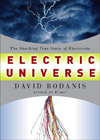|
||
     |
Peer Review ::
Let there be light
Writer David Bodanis, AB’77, explores the genesis of an electrified world.
 It’s
actually a very sad story,” mourns David Bodanis, pointing his shoe
at an empty baseboard socket during a Tuesday evening book lecture. The
force that pushes electrons along, he explains, has come rushing from a
distant generator to this socket’s edge, crying, “Choose me!”
But with no toaster or laptop to embrace the energy, it will be exiled back
to its origin unfulfilled.
It’s
actually a very sad story,” mourns David Bodanis, pointing his shoe
at an empty baseboard socket during a Tuesday evening book lecture. The
force that pushes electrons along, he explains, has come rushing from a
distant generator to this socket’s edge, crying, “Choose me!”
But with no toaster or laptop to embrace the energy, it will be exiled back
to its origin unfulfilled.
This brief tale of unrequited voltage, and other gossipy tidbits shared at Bodanis’s talk—delivered at high speed by the energetic author—come from Electric Universe: The Shocking True Story of Electricity (Crown, 2005). Covering the physics of the fundamental force along with early electric inventions and their inventors, Electric Universe takes an anecdotal approach to science. “I decided to wrap it around a dozen or so people,” Bodanis says, exploring the lives of such luminaries as Samuel Morse, Alexander Graham Bell, and Thomas Edison not only to poke fun at their numerous quirks but also to illustrate complicated concepts.
One of Bodanis’s favorite true tales is “Aleck and Mabel,” the 19th-century story of two not quite star-crossed lovers. Aleck, a 28-year-old teacher, falls in love with 17-year-old Mabel, a student in his class for the deaf. He declares himself to Mabel’s parents, Boston Brahmans who forbid Aleck to court their daughter. Determined to win Mabel’s affection and her parents’ approval, he pursues an idea that he hopes will earn him fame and fortune enough.
By 1875—thanks to the eccentric (and sometimes bigoted) Morse and the kindhearted, “rawboned American” inventor Joseph Henry—use of the telegraph is widespread. But Aleck dreams of sending more than clicks across the line. Recalling his classroom experiences, when he held Mabel’s hand to his throat so she could feel the sounds’ vibrations, Aleck develops an artificial larynx: a parchment that quivers with each puff of breath, alternately constricting and releasing an electrified wire. He wins a patent and triumphantly claims his bride. For the wedding, Bodanis gleefully continues, Aleck gives Mabel “pearls, a silver pendant in the shape of a telephone, and 1,497 shares of stock in the fledgling Bell Telephone company—which would be worth, if kept in the family, several billion dollars today.”
Electric Universe continues in that vein: the greedy, patent-swiping Edison, Bodanis reveals, was said to have a vacuum where his conscience should have been. The faith of Michael Faraday, who believed that a divine presence permeated the universe, led him to discover electromagnetism. The melancholic André-Marie Ampère, who studied electric current, inscribed tandem felix (“happy at last”) on his tombstone.
In fact, shocking, or at least unexpected, details so colored electricity’s early days that Bodanis is forced to gloss some over in his 308-page book, tersely summarizing the setbacks of a transatlantic telegraph cable: “there were high storms, and swindlers, and parliamentary inquests, and an attack by a whale, and an embarrassing occasion when New York’s City Hall nearly burned down.”
Besides a liberal sprinkling of salacious particulars—a method Bodanis mastered in his earlier hit E=mc2 (Diane, 2000), a biography of the famous equation that included, he says, “gratuitous sex and violence”—Electric Universe’s “trick” for making science interesting, he explains during a later appearance on Michael Feldman’s NPR show Whad’Ya Know?, “is to pretend it’s not science.”
Electricity’s story, as told by Bodanis, doesn’t begin with a technical rundown of electrons, which are eventually covered, but rather “inside the mouth of a slightly disturbed Northern Italian in the 1790s.” Alessandro Volta, it seems, “spent a lot of time playing with his tongue.” Experimenting with metal disks, he realized that when two coins on either side of his tongue touched, he felt a sizzle he likened to a river’s current. Thus Volta created the world’s first steadily operating battery.
Bodanis, who lectured for many years at Oxford University, attributes his penchant for such tales to growing up in a house full of sisters. “I just love telling stories,” he says. “I love to gossip.”